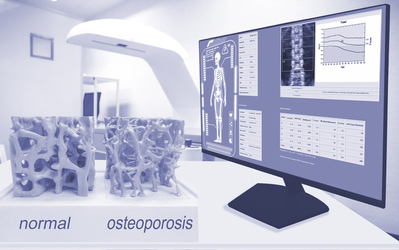Who Needs to Have a Bone Density Test?
 Bone density testing is most often used to determine if someone has osteoporosis, a condition in which an individual has weak and/or brittle bones, making them more likely to suffer bone fractures.
Bone density testing is most often used to determine if someone has osteoporosis, a condition in which an individual has weak and/or brittle bones, making them more likely to suffer bone fractures.
What is osteoporosis?
Osteoporosis is much more common in females than in males, and it becomes more common after menopause and with advancing age.
And yet, while osteoporosis is more prevalent in older women, men also can develop this condition. So, whether you are a man or woman, young or old, a physician could recommend that you have a bone density test if you have:
- Lost 1.5 inches in height or more. (Because you may have compression fractures in your spine.)
- A close relative who had osteoporosis,
- Fractured a bone. (Because this may be a sign of the fragility of the bones.)
- Been on steroid medications for a long period of time. (Because this can impede the bone-rebuilding process, which can lead to osteoporosis.)
- Experienced a drop in hormone levels.
What is a bone density test?
Bone density tests compare your individual bone density with the established standards for what is expected in someone of your age, gender, and size, as well as compared to the optimal peak bone density of a healthy young adult of the same gender. This test can assist in detecting low bone density before a fracture occurs and possibly predict your chances of fracturing in the future.
The higher your bone mineral content (especially calcium), the denser your bones are. And the denser your bones, the stronger they generally are. And, therefore, less likely to fracture.
It should also be noted that bone density tests are not the same as bone scans. Bone scans require an injection and are most often employed to detect fractures, cancer, infections, and other abnormalities in the bone.
In summary, bone density tests assist healthcare providers in detecting bone loss in people who might otherwise have no symptoms. They are painless, quick, and safe, and they can signal bone loss before a painful fracture happens. These tests are also useful in tracking the effects of medications used to manage bone disease.
